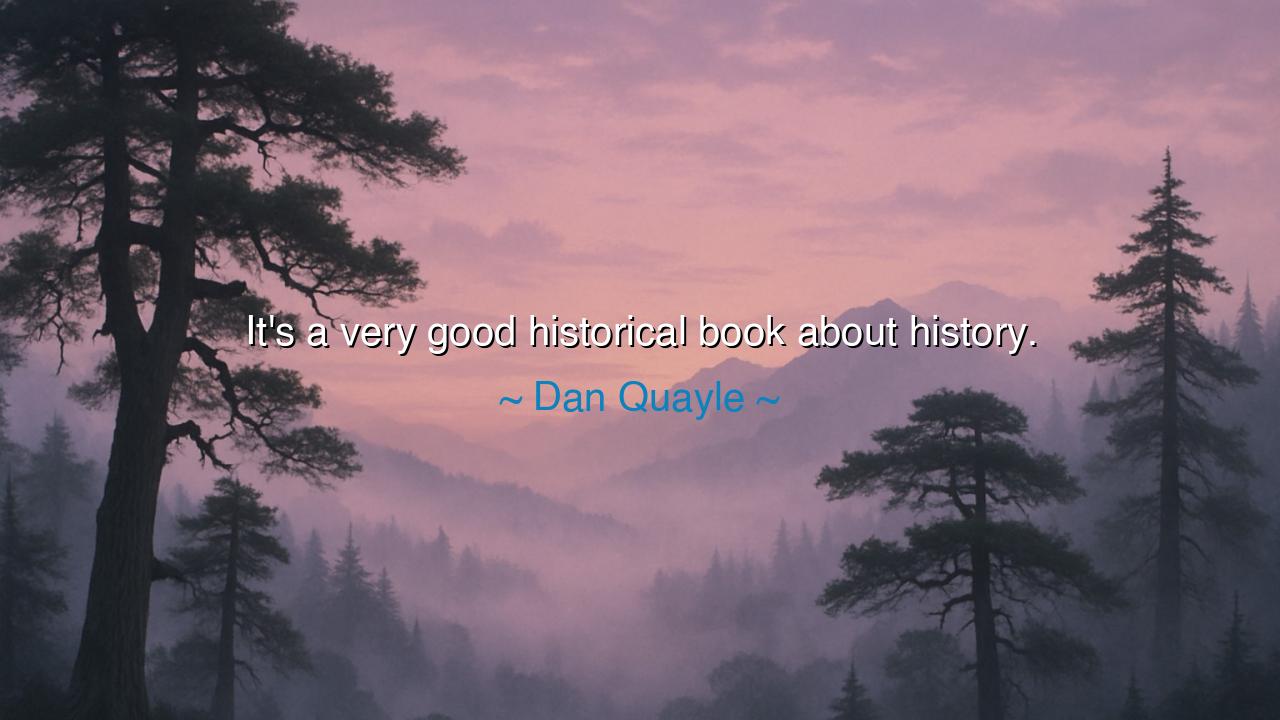
It's a very good historical book about history.






“It’s a very good historical book about history.” So spoke Dan Quayle, the former Vice President of the United States, a man often remembered for the simplicity — and sometimes the awkwardness — of his words. At first glance, this phrase seems almost comical in its redundancy, a tautology born of nervous speech. Yet, like many sayings that appear clumsy on the surface, it contains a kernel of unintended wisdom — a truth about how we perceive history, and how we engage with the stories that define our civilization. For often, in the pursuit of complexity, men forget that truth sometimes hides in simplicity.
The origin of this quote lies in a public event during Quayle’s vice presidency, when he offered his thoughts on a book of history he had recently read. His phrasing, widely mocked by the press, became emblematic of his verbal missteps. Yet if we strip away the laughter and look with the eye of a philosopher rather than a jester, we might find meaning in the man’s unwitting candor. When he called it “a very good historical book about history,” he expressed — perhaps in childlike sincerity — what many forget: that the value of a historical work lies not merely in its scholarship or prose, but in its ability to connect us to the living essence of history itself.
In his naïve repetition, Quayle pointed to something deeper — that history is not merely a subject, but an experience. It is not a pile of dusty facts, but a mirror in which we see ourselves. To call a book “historical” is to acknowledge that it reaches into the past; to call it “about history” is to admit that it illuminates the patterns that bind past to present. The redundancy, then, becomes emphasis — the way a poet might repeat a word to awaken reverence. History, truly told, is both record and revelation. It is the chronicle of what happened, and the echo of what still happens in every human heart.
Consider, for example, the historian Herodotus, often called the “Father of History.” His Histories were not simply accounts of battles and kings; they were living tales — filled with questions, wonder, and awe at the workings of fate. He was not content to recite events; he sought to understand what those events meant. In that sense, his work was not only a historical book but a book about history itself — about the forces that drive humanity, the lessons that repeat, the follies that endure. Perhaps Quayle, without realizing it, echoed that ancient wisdom — that the true student of history does not read only to know what was, but to understand what always is.
In this way, Quayle’s accidental profundity teaches a strange but powerful lesson: that even simplicity can bear truth. His words remind us that wisdom is not always clothed in eloquence. The sages of old often spoke in riddles; the prophets in paradox. So too, sometimes, does truth stumble out of the mouths of the unguarded. When he spoke of a “historical book about history,” he unintentionally highlighted the unity between form and essence, between the vessel and what it contains. For history, like the human soul, is both the record and the recording — the living remembrance of itself.
And beyond that, his words can also be seen as a warning. In our age, when the study of history is often treated as an ornament rather than a guide, we risk forgetting that history is not just a field of study but a sacred inheritance. A “historical book about history” — if one truly reflects on the phrase — should not merely inform, but transform. It should awaken in its readers a sense of belonging to the great continuum of human endeavor. It should remind them that they, too, are characters in the unfolding story of mankind — heirs to both its triumphs and its tragedies.
So, my children, laugh if you must at the clumsy phrasing of a statesman, but do not miss the lesson hidden in his words. When next you read a book of history, read it not with the detachment of a scholar, but with the reverence of a participant. See in its pages the reflection of your own age — the same ambitions, the same errors, the same hopes reborn under new names. Let every tale of the past remind you that you are a link in the eternal chain. For in the end, every “historical book about history” is really a book about you — about what you are capable of remembering, and what you are capable of becoming.
Thus, even from the lips of the simple may fall a truth eternal: that history is not a relic, but a mirror; not a subject, but a soul. And those who read it with open hearts will find not only knowledge of what has been, but wisdom for what must yet come.






AAdministratorAdministrator
Welcome, honored guests. Please leave a comment, we will respond soon